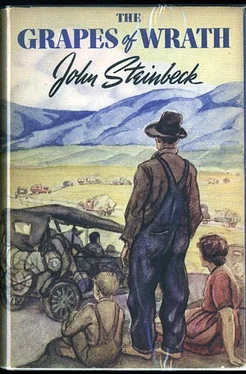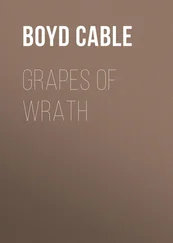John Steinbeck - The Grapes of Wrath
Здесь есть возможность читать онлайн «John Steinbeck - The Grapes of Wrath» весь текст электронной книги совершенно бесплатно (целиком полную версию без сокращений). В некоторых случаях можно слушать аудио, скачать через торрент в формате fb2 и присутствует краткое содержание. Город: New York, Год выпуска: 1939, Издательство: The Viking Press-James Lloyd, Жанр: Классическая проза, на английском языке. Описание произведения, (предисловие) а так же отзывы посетителей доступны на портале библиотеки ЛибКат.
- Название:The Grapes of Wrath
- Автор:
- Издательство:The Viking Press-James Lloyd
- Жанр:
- Год:1939
- Город:New York
- ISBN:нет данных
- Рейтинг книги:5 / 5. Голосов: 1
-
Избранное:Добавить в избранное
- Отзывы:
-
Ваша оценка:
- 100
- 1
- 2
- 3
- 4
- 5
The Grapes of Wrath: краткое содержание, описание и аннотация
Предлагаем к чтению аннотацию, описание, краткое содержание или предисловие (зависит от того, что написал сам автор книги «The Grapes of Wrath»). Если вы не нашли необходимую информацию о книге — напишите в комментариях, мы постараемся отыскать её.
The Grapes of Wrath — читать онлайн бесплатно полную книгу (весь текст) целиком
Ниже представлен текст книги, разбитый по страницам. Система сохранения места последней прочитанной страницы, позволяет с удобством читать онлайн бесплатно книгу «The Grapes of Wrath», без необходимости каждый раз заново искать на чём Вы остановились. Поставьте закладку, и сможете в любой момент перейти на страницу, на которой закончили чтение.
Интервал:
Закладка:
The family became a unit. Pa squatted down on the ground, and Uncle John beside him. Pa was the head of the family now. Ma stood behind him. Noah and Tom and Al squatted, and the preacher sat down, and then reclined on his elbow. Connie and Rose of Sharon walked at a distance. Now Ruthie and Winfield, clattering up with a bucket of water held between them, felt the change, and they slowed up and set down the bucket and moved quietly to stand with Ma.
Granma sat proudly, coldly, until the group was formed, until no one looked at her, and then she lay down and covered her face with her arm. The red sun set and left a shining twilight on the land, so that faces were bright in the evening and eyes shone in reflection of the sky. The evening picked up light where it could.
Pa said, “It was in Mr. Wilson’s tent.”
Uncle John nodded. “He loaned his tent.”
“Fine friendly folks,” Pa said softly.
Wilson stood by his broken car, and Sairy had gone to the mattress to sit beside Granma, but Sairy was careful not to touch her.
Pa called, “Mr. Wilson!” The man scuffed near and squatted down, and Sairy came and stood beside him. Pa said, “We’re thankful to you folks.”
“We’re proud to help,” said Wilson.
“We’re beholden to you,” said Pa.
“There’s no beholden in a time of dying,” said Wilson, and Sairy echoed him, “Never no beholden.”
Al said, “I’ll fix your car—me an’ Tom will.” And Al looked proud that he could return the family’s obligation.
“We could use some help.” Wilson admitted the retiring of the obligation.
Pa said, “We got to figger what to do. They’s laws. You got to report a death, an’ when you do that, they either take forty dollars for the undertaker or they take him for a pauper.”
Uncle John broke in, “We never did have no paupers.” Tom said, “Maybe we got to learn. We never got booted off no land before, neither.”
“We done it clean,” said Pa. “There can’t no blame be laid on us. We never took nothin’ we couldn’ pay; we never suffered no man’s charity. When Tom here got in trouble we could hold up our heads. He only done what any man would a done.”
“Then what’ll we do?” Uncle John asked.
“We go in like the law says an’ they’ll come out for him. We on’y got a hundred an’ fifty dollars. They take forty to bury Grampa an’ we won’t get to California—or else they’ll bury him a pauper.” The men stirred restively, and they studied the darkening ground in front of their knees.
Pa said softly, “Grampa buried his pa with his own hand, done it in dignity, an’ shaped the grave nice with his own shovel. That was a time when a man had the right to be buried by his own son an’ a son had the right to bury his own father.”
“The law says different now,” said Uncle John.
“Sometimes the law can’t be foller’d no way,” said Pa. “Not in decency, anyways. They’s lots a times you can’t. When Floyd was loose an’ goin’ wild, law said we got to give him up—an’ nobody give him up. Sometimes a fella got to sift the law. I’m sayin’ now I got the right to bury my own pa. Anybody got somepin to say?”
The preacher rose high on his elbow. “Law changes,” he said, “but ’got to’s’ go on. You got the right to do what you got to do.” Pa turned to Uncle John. “It’s your right too, John. You got any word against?”
“No word against,” said Uncle John. “On’y it’s like hidin’ him in the night. Grampa’s way was t’come out a-shootin’.”
Pa said ashamedly, “We can’t do like Grampa done. We got to get to
California ’fore our money gives out.”
Tom broke in, “Sometimes fellas workin’ dig up a man an’ then they raise hell an’ figger he been killed. The gov’ment’s got more interest in a dead man than a live one. They’ll go hell-scrapin’ tryin’ to fin’ out who he was and how he died. I offer we put a note of writin’ in a bottle an’ lay it with Grampa, tellin’ who he is an’ how he died, an’ why he’s buried here.”
Pa nodded agreement. “Tha’s good. Wrote out in a nice han’. Be not so lonesome too, knowin’ his name is there with ’im, not jus’ a old fella lonesome underground. Any more stuff to say?” The circle was silent.
Pa turned his head to Ma. “You’ll lay ’im out?”
“I’ll lay ’im out,” said Ma. “But who’s to get supper?”
Sairy Wilson said, “I’ll get supper. You go right ahead. Me an’ that big girl of yourn.”
“We sure thank you,” said Ma. “Noah, you get into them kegs an’ bring out some nice pork. Salt won’t be deep in it yet, but it’ll be right nice eatin’.”
“We got a half sack a potatoes,” said Sairy.
Ma said, “Gimme two half-dollars.” Pa dug in his pocket and gave her the silver. She found the basin, filled it full of water, and went into the tent. It was nearly dark in there. Sairy came in and lighted a candle and stuck it upright on a box and then she went out. For a moment Ma looked down at the dead old man. And then in pity she tore a strip from her own apron and tied up his jaw. She straightened his limbs, folded his hands over his chest. She held his eyelids down and laid a silver piece on each one. She buttoned his shirt and washed his face.
Sairy looked in, saying, “Can I give you any help?”
Ma looked slowly up. “Come in,” she said. “I like to talk to ya.”
“That’s a good big girl you got,” said Sairy. “She’s right in peelin’ potatoes. What can I do to help?”
“I was gonna wash Grampa all over,” said Ma, “but he got no other clo’es to put on. An’ ’course your quilt’s spoilt. Can’t never get the smell a death from a quilt. I seen a dog growl an’ shake at a mattress my ma died on, an’ that was two years later. We’ll drop ’im in your quilt. We’ll make it up to you. We got a quilt for you.”
Sairy said, “You shouldn’ talk like that. We’re proud to help. I ain’t felt so—safe in a long time. People needs—to help.”
Ma nodded. “They do,” she said. She looked long into the old whiskery face, with its bound jaw and silver eyes shining in the candlelight. “He ain’t gonna look natural. We’ll wrop him up.”
“The ol’ lady took it good.”
“Why, she’s so old,” said Ma, “maybe she don’t even rightly know what happened. Maybe she won’t really know for quite a while. Besides, us folks takes a pride holdin’ in. My pa used to say, ’Anybody can break down. It takes a man not to.’ We always try to hold in.” She folded the quilt neatly about Grampa’s legs and around his shoulders. She brought the corner of the quilt over his head like a cowl and pulled it down over his face. Sairy handed her half-a-dozen big safety pins, and she pinned the quilt neatly and tightly about the long package. And at last she stood up. “It won’t be bad burying,” she said. “We got a preacher to see him in, an’ his folks is all aroun’.” Suddenly she swayed a little, and Sairy went to her and steadied her. “It’s sleep—” Ma said in a shamed tone. “No, I’m awright. We been so busy gettin’ ready, you see.”
“Come out in the air,” Sairy said.
“Yeah, I’m all done here.” Sairy blew out the candle and the two went out.
A bright fire burned in the bottom of the little gulch. And Tom, with sticks and wire, had made supports from which two kettles hung and bubbled furiously, and good steam poured out under the lids. Rose of Sharon knelt on the ground out of range of the burning heat, and she had a long spoon in her hand. She saw Ma come out of the tent, and she stood up and went to her.
“Ma,” she said. “I got to ask.”
“Scared again?” Ma asked. “Why, you can’t get through nine months without sorrow.”
Читать дальшеИнтервал:
Закладка:
Похожие книги на «The Grapes of Wrath»
Представляем Вашему вниманию похожие книги на «The Grapes of Wrath» списком для выбора. Мы отобрали схожую по названию и смыслу литературу в надежде предоставить читателям больше вариантов отыскать новые, интересные, ещё непрочитанные произведения.
Обсуждение, отзывы о книге «The Grapes of Wrath» и просто собственные мнения читателей. Оставьте ваши комментарии, напишите, что Вы думаете о произведении, его смысле или главных героях. Укажите что конкретно понравилось, а что нет, и почему Вы так считаете.











